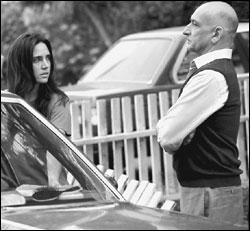HISTORY IS WRITTEN with land and bloodusually the blood of landowners being displaced by newer immigrants. It’s not a theme most Americans want to dwell on (having generally been the winner in such exchanges), but it’s the basis for the somber suburban tragedy House of Sand and Fog (opens Friday, Dec. 26, at Meridian and other theaters), which is pretty much the opposite of a cheerful holiday pick-me-up kind of film. The first clue that things will take a dark turn in this Bay Area bedroom suburb, hazily sunlit by the great cinematographer Roger Deakins through sopping marine air, is the source material. The movie is based, with almost total fidelity, on the fine 1999 novel by Andre Dubus III whose father incidentally wrote the story underlying In the Bedroom).
If, by way of paternal legacy, you immediately think domestic quarrels, easily available handguns, loose women, and sudden violence, you’ll not be wrong about the film. Certainly its recovering alcoholic heroine, Kathy (Jennifer Connelly), is in need of a good slapping from Sissy Spacekanything to get her out of bed in the morning. Abandoned by her unseen no-good husband, unsteadily off the wagon, she lives alone in the not-quite-beach-view ’60s rambler inherited from her late father (her unseen mother, for reasons left unclear, makes periodic calls from the East Coast). Kathy is a total fuckup; House makes no excuses for that. Reduced to cleaning other people’s homes, her own home covered with trash, she wallows in bed, cigarettes, and self-pity. This is a woman, it seems, who’s far too dumb, lazy, and unambitious to ever cause trouble for anyone.
But like Marisa Tomei’s dark-haired, destabilizing temptress in Bedroom, Kathy creates trouble in repose. She’s a kind of slacker femme fatale, lethal by inertia; and the picture is more of a legal procedural (or misprocedural) than a noir or thriller. First, her sloth gets her evicted from her home for nonpayment of taxes (which, in the book, were misaddressed, although that point gets fudged here). Then her house is repossessed and auctioned off by the county, and Kathy takes up residence in the “Hotel Bonneville”her carwhich she decorates with the same scheme of fast-food wrappers, cigarette butts, and take-out coffee cups.
IN SHORT, KATHY IS NOT a good American, unlike hard-working, upright Iranian immigrant Col. Behrani (Ben Kingsley), who buys her house at the auction for about one-third of its market value. A former flunky for the Shah, a refugee from the Ayatollah, he’s virtually blown his family’s finances on marrying off his eldest daughter. He works on a highway crew and in a fast-food mart to support his culture-shocked, thoroughly depressed wife (Iranian actress Shohreh Aghdashloo, just voted Best Supporting Actress by the New York Film Critics Circle) and much more Americanized skateboarding teen son (Jonathan Ahdout). When an indignant Kathy shows up on his door (or her door, she calls it), he contemptuously treats her like a Tehran street beggar threatening to smudge his spit-shined shoes. She and her lawyer make threats; he refuses to sell. The system is to blame, he tells her, not him. His pride won’t allow him to back downespecially to a woman. So begins their battle.
Debut director Vadim Perelman (himself an immigrant to Rome, then Canada from the former Soviet Union) convincingly accrues all the story’s mundane detailsthe tax notice, the auction, Kathy’s futile trips to a lawyer, her cleaning jobs, Behrani’s preparations to re-sell the house for a windfall. No obvious alarms are raised, and yet House is a quietly alarming movie, alarming that the entire American system can go off the rails so insidiously, that the taxman and the lawyer and the sheriff (Ron Eldard) can do nothing to reverse the process, making victims of Kathy and Behrani alike.
Connelly’s role is naked Oscar-bait, but its fundamental passivity works against her, compounding the mumbling-at-my-shoes tendency she displayed during her A Beautiful Mind Oscar acceptance speech. A more skilled and volatile actress (like, say, Laura Linney) might’ve been able to sass up the part, but here Kathy becomes a kind of whipped puppy with limpid brown spaniel eyes. She’s to be pitied, not loved. Eldard’s Sheriff Burdon wants to be the chivalrous knight who rescues this damsel; to the actor’s credit, he shows how that impulse is more a shield for his own weakness than an act of strength. (But then, what man could resist Connelly’s eyebrows?)
Kingsley, so strongly resurgent after Sexy Beast, might be seen as the monster in a more conventional tale (or fairy tale), but he makes his martinet recognizably human. Yes, he slaps his wife, berates his son, and scorns Kathy. But the house means more to him than it does to Kathy; it means dignity.”Americans do not deserve what they have,” he declares; and he’s not entirely wrong in that opinion. Rather than a tragic contest between two stubborn, principled people who won’t back down from their claim, here’s a fight between stubborn, unlikable peoplehumanity as we don’t generally see it this time of year. Naughty or nice, character determines fate.
DESPITE THE SOFTENED ending (the script, unlike the book, crucially makes Kathy less complicit in Burdon’s final actions), I like the film, but then I’m also a holiday-hating misanthrope. Bah, humbug if you want happy endings, go see a comedy like Cheaper by the Dozen (unless it’s a tragedy for Steve Martin’s career). Both waifish Kathy and Scrooge-like Behrani are given a fleeting second chance, a moment of grace like some Dickensian feast where good cheer returns to all menchiefly thanks to the genuine charity of Behrani’s wife and son. But don’t get your hopes up. This is America, not Dickens’ England, so House can’t be A Christmas Carol.








